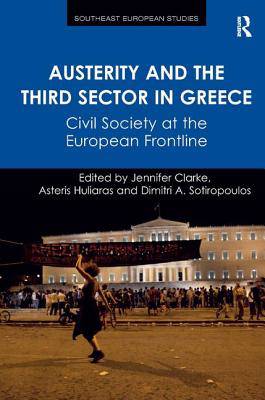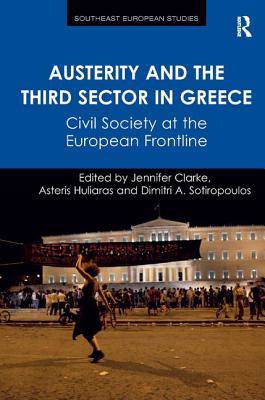
Door een staking bij bpost kan je online bestelling op dit moment iets langer onderweg zijn dan voorzien. Dringend iets nodig? Onze winkels ontvangen jou met open armen!
- Afhalen na 1 uur in een winkel met voorraad
- Gratis thuislevering in België vanaf € 30
- Ruim aanbod met 7 miljoen producten
Door een staking bij bpost kan je online bestelling op dit moment iets langer onderweg zijn dan voorzien. Dringend iets nodig? Onze winkels ontvangen jou met open armen!
- Afhalen na 1 uur in een winkel met voorraad
- Gratis thuislevering in België vanaf € 30
- Ruim aanbod met 7 miljoen producten
Zoeken
Austerity and the Third Sector in Greece
Civil Society at the European Frontline
Jennifer Clarke, Asteris Huliaras, Dimitri Sotiropoulos
€ 182,45
+ 364 punten
Uitvoering
Omschrijving
Organised civil society in Greece is generally regarded as weak with rankings for associational density, volunteerism and levels of social capital traditionally among the lowest in Europe. Austerity and the Third Sector in Greece explores the context behind the statistics and general perceptions of a society of takers, not givers. Stereotypes of a country living beyond its means have been exacerbated by the Eurozone crisis but, since 2008, there has in fact been a great proliferation of organised civil society initiatives in the country. Has the financial crisis seen a belated awakening of Greek civil society? Offering a broad overview of contemporary civil society in Greece this book explores how various characteristics of the country's socio-political context have affected the development of the third sector and examines the effect of the economic crisis on it. Expert contributors combine macro-level analyses with local case studies to form a fascinating new study on the influences of national and regional context on civil society development. Their findings provide not only for a better understanding of similar movements, but also contribute to wider academic debates on societal responses to economic crises.
Specificaties
Betrokkenen
- Auteur(s):
- Uitgeverij:
Inhoud
- Aantal bladzijden:
- 296
- Taal:
- Engels
- Reeks:
Eigenschappen
- Productcode (EAN):
- 9781472452689
- Verschijningsdatum:
- 28/08/2015
- Uitvoering:
- Hardcover
- Formaat:
- Genaaid
- Afmetingen:
- 156 mm x 233 mm
- Gewicht:
- 599 g

Alleen bij Standaard Boekhandel
+ 364 punten op je klantenkaart van Standaard Boekhandel
Beoordelingen
We publiceren alleen reviews die voldoen aan de voorwaarden voor reviews. Bekijk onze voorwaarden voor reviews.











